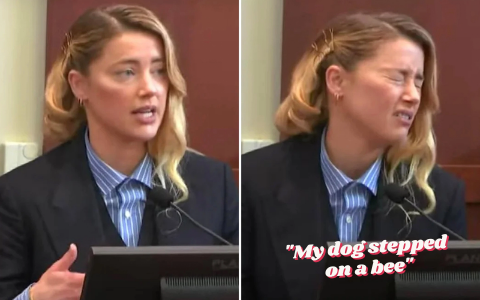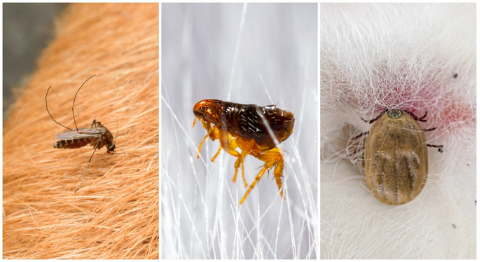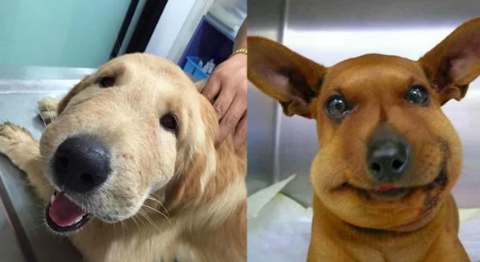No Products in the Cart
Bee and Other Insects Bites and Stings- Is Amber Right to Worry?

If you scroll on social media these days, you most likely encounter people making fun of Amber Heard for her famous "My dog stepped on a bee." We don't bring this up to take a side but rather highlight something important to pet parents. Indeed isn't she right to be worried about her dog being stung by a bee?
Summertime brings buzzing and flying insects that are hard at work in our gardens. If you have a dog or a cat, you probably saw them "hunting" these insects, and your pet most likely made you laugh by doing all kinds of crazy movements to catch them! But beware, some of them are not afraid to put up a fight and use a painful defense technique: the bite or sting!

What kind of insects may sting or bite your dog?
Insects may bite your dog for different reasons. Some insects, such as mosquitos, will bite to feed, while others, like bumblebees, will sting to defend themselves when they feel under attack. The following insects are the ones that bite your dog to eat:
- Fleas
- Ticks
- Mosquitoes and sandflies
- Mites
- Flies

On the contrary, Apidae like bees and Vespidae like wasps and hornets might sting your dog, but only if they feel in danger, not for feeding purposes. So when dogs and cats try to play or pray on them, these insects will hurt your pet.
Also Read: Is Your Dog Prone to Elbow Dysplasia? Symptoms and Best Treatments
Also concerning is that our furry companions often swallow them. Sometimes it happens accidentally. Other times it's intentional. Although the acid in the stomach will kill the insect, there is a risk that they will sting your dog or cat in the mouth.
Stinging can lead to severe inflammation around the mouth and the respirator airways, leading to respiratory distress.
A fun fact is that ants can also inject venom into your dog by bitting. Although little, these insects can cause severe burning!
Why are bee, wasp, and hornet bites dangerous for your dog and cat?
These insects have an external stinger linked to an internal venom gland. This " device " penetrates the skin when a bee, wasp, or hornet stings. Then, it injects parts or all of the venom stored in the gland.
If you or your pet is stung by a bee, you might see that the sting often remains on the skin of its victims. Also, if you look carefully, you will see two small structures next to the sting: they are the full venom sacs.
If that happens, bees will not survive. On the other hand, Wasps do not suffer this loss: their stinger remains intact, allowing them to sting you repeatedly. This can lead to excruciating wounds and can be deadly.
Also Read: Best Glucosamine for Dogs in 2024 - A Vet’s Honest Opinion
Should I be worried about my dog being bitten or stung?
An insect bite or sting causes severe pain and a local skin reaction (redness). If it happens to your pet, you will probably see them lick themselves or itch vigorously.
Most of the time, the recovery is spontaneous in less than 24 hours.
But if you shouldn't be that worried that your dog stepped on a bee, you should monitor them closely after it happens and watch for specific signs that could indicate a complication.
In severe cases, general and painful symptoms can appear, especially in the case of multiple stings. They occur within a few minutes to a few hours. Although these generalized reactions are less frequent, they can be fatal:
- Digestive disorders such as vomiting,
- Clotting disorders,
- Decreased or increased blood pressure,
- Liver failure,
- Acute renal failure,
- Anaphylactic Shock
If your dog is allergic to bee or wasp venom, you'll see a local inflammatory reaction following the "OR" Latin rules: Rubor (red), Dolor (painful), Calor (Warm), and Tumor (swollen).
Often, this inflammatory reaction recedes within a few days to a few weeks. But in more severe cases, the allergic reaction can lead to more general symptoms such as:
- A hives reaction: generalized itching and swelling.
- Digestive problems: vomiting, diarrhea, and abdominal pain.
- Respiratory problems.
- Heart problems: slowed heart rate.

These symptoms can be perilous and lead to death (primarily because of respiratory and heart problems) in case of an anaphylactic shock reaction.
Also Read: Dog Hip dysplasia: Symptoms, Treatments and Solutions
What should I do if my dog is bitten or stung?
Here are the first things to do when your dog is bitten or stung :
- Remove the stinger if it is visible, taking care not to squeeze the venom sac if it is present.
- Disinfect the area of inoculation to avoid secondary infections.
- Remove your pet's collar or anything that could act as a tourniquet if swelling occurs.
- Keep your furry friend under surveillance for about 12-24 hours.
Call and go to your veterinarian immediately if you notice any of the following:
- Your dog has multiple stings.
- Your dog had allergic reactions to any insect bites/sting.
- The stinging happens around the throat or mouth.
- Your dog ingested the insect.
- Your dog has any of the generalized symptoms mentioned above.
Your veterinarian will be able to set up the appropriate care protocol.
Amber, we feel for you! :)















Leave a comment